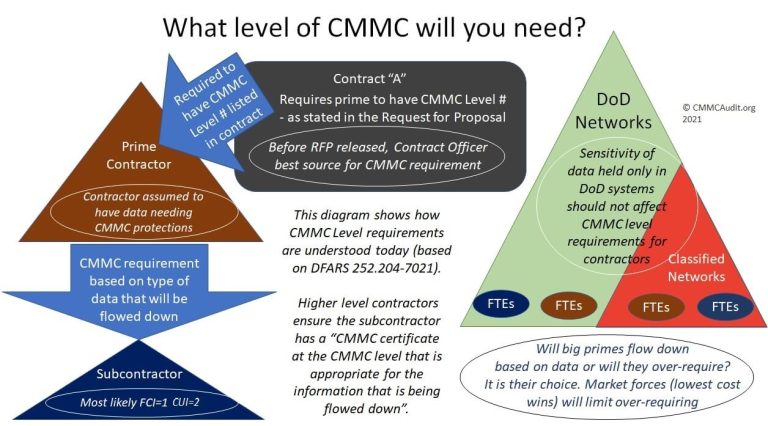Why Your Competitors Are Secretly Prioritizing CMMC Level 2 Requirements
Winning government contracts isn’t just about offering the best product or service—it’s about proving you can protect sensitive information. While some companies are still figuring out where to start with CMMC compliance requirements, others are moving ahead, ensuring they meet CMMC level 2 requirements before they become mandatory. The businesses that prioritize cybersecurity now are positioning themselves for long-term success while others scramble to catch up.
Locking in Defense Contracts While Others Struggle with Compliance Gaps
Defense contractors that achieve CMMC level 2 requirements early gain a significant advantage in securing contracts. The Department of Defense is increasingly enforcing strict cybersecurity standards, and businesses that can demonstrate compliance stand out as reliable partners. Many competitors are quietly ensuring their systems align with CMMC compliance requirements now so they won’t face delays or disqualification when these standards become non-negotiable.
Companies failing to meet CMMC requirements risk losing out on lucrative opportunities. As government agencies and prime contractors demand proof of compliance, businesses still working on their CMMC assessment may find themselves edged out of critical contracts. Those who act proactively secure a stable revenue stream while their competitors struggle with audits, documentation, and last-minute fixes to meet the evolving requirements.
Strengthening Vendor Relationships by Proving Cybersecurity Maturity
Contractors who demonstrate CMMC level 2 requirements aren’t just winning over the government; they’re also earning the trust of vendors and suppliers. A company that prioritizes cybersecurity shows its partners that it takes data protection seriously, reducing the risk of supply chain vulnerabilities. Vendors are more likely to work with businesses that maintain strong security postures, ensuring safer and more reliable partnerships.
A lack of compliance can disrupt vendor relationships, leading to stalled projects and lost business opportunities. Companies that fail to meet CMMC compliance requirements may find suppliers hesitant to collaborate, fearing potential security breaches that could impact their own compliance standing. Meeting these standards reassures partners and strengthens long-term business relationships in industries where trust and security are paramount.
Enhancing Supply Chain Security to Prevent Breach-Related Disruptions
Cyber threats don’t just target individual companies—they exploit weak links in entire supply chains. Businesses that meet CMMC level 2 requirements help create a more secure environment for their partners, reducing the risk of data leaks and cyberattacks that could cause costly disruptions. Competitors who recognize this are working behind the scenes to reinforce their cybersecurity framework before vulnerabilities become liabilities.
Organizations that ignore CMMC requirements put not just their own operations at risk but also those of every company they work with. A single breach can cascade through the supply chain, leading to halted projects, financial losses, and damaged reputations. Contractors who prioritize CMMC compliance requirements ensure their business remains a reliable link in the defense and aerospace industries, avoiding disruptions that can take months or years to recover from.
Securing a Reputation as a Trusted Partner in Government and Aerospace Sectors
Trust is everything in industries handling sensitive government data. Contractors who invest in meeting CMMC level 2 requirements establish themselves as dependable partners capable of safeguarding controlled unclassified information (CUI). As more organizations tighten their security expectations, being ahead of CMMC compliance requirements puts companies in a stronger position to secure long-term partnerships.
Competitors who achieve compliance before regulations become fully enforced gain an edge in credibility. Government agencies and large defense contractors prefer working with businesses that proactively manage security risks instead of reacting to compliance deadlines at the last minute. A company that demonstrates strong cybersecurity practices earns the trust needed to secure repeat contracts and long-term collaborations in high-stakes sectors.
Gaining Faster Approval for Classified and High-Security Projects
Achieving CMMC level 2 requirements isn’t just about maintaining compliance—it’s about getting through approval processes faster. Companies that meet these standards early can move ahead with classified projects while others wait for their security measures to be validated. Faster approvals mean quicker access to high-value contracts and less time navigating bureaucratic hurdles.
Competitors who plan ahead avoid delays that can push them out of contention for critical projects. As government agencies continue tightening security protocols, companies that still struggle with CMMC assessments will face setbacks in getting approvals for sensitive work. Those who already meet the necessary cybersecurity thresholds position themselves as preferred candidates for classified projects that demand a high level of security.
Positioning Themselves for Future Regulations Before They Become Mandatory
CMMC compliance requirements are only becoming more stringent, and businesses that get ahead now won’t have to scramble when new regulations roll out. The companies quietly prioritizing CMMC level 2 requirements recognize that cybersecurity expectations will only increase, and they’re taking proactive steps to prepare. By building security frameworks now, they ensure they won’t be caught off guard when stricter policies emerge.
Companies that wait too long risk falling behind as new standards take effect. The businesses leading the charge on cybersecurity understand that regulations evolve, and they future-proof their operations by continuously strengthening their security measures. Rather than playing catch-up when compliance becomes mandatory, these companies will already be well-positioned to meet the next set of cybersecurity challenges without disrupting their business operations.



